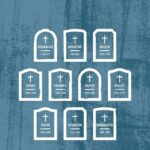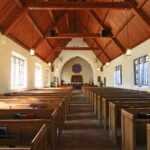As C. S. Lewis famously pointed out, old books often show us things we miss because of the particular blind spots of our own age.[1] For that reason I was struck when I recently read the Reformer John Calvin’s advice for responding to times of plague. He writes,
… if either pestilence, or famine, or war begins to rage, or if any disaster seems to threaten any district and people—then also it is the duty of the pastors to urge the church to fasting, in order that by supplication the Lord’s wrath may be averted. For where he causes danger to appear he warns that he is ready and, so to speak, armed for vengeance. Therefore, as in ancient times the accused were accustomed to abase themselves as suppliants with long beard, unkempt hair, and dark clothing, in order to appeal to the mercy of the judge—so, when we stand before God’s judgment seat, it redounds to his glory and to edification of the people, and is also profitable and salutary for us in humble garb to pray that his severity be averted.[2]
Or again Calvin writes,
For it sometimes will happen that God will strike a nation with war, or pestilence, or some calamity. Under this common scourge, the whole people ought to accuse themselves and confess their guilt.[3]
What strikes me about Calvin’s comments is his reference to God’s wrath and the call for universal humility and repentance—expressed particularly through fasting. In most of my reading of the Christian response to COVID-19 that element seems almost entirely absent.[4] Even the Pope is at pains to point out that this situation has nothing to do with God’s anger.[5]
What strikes me is Calvin’s reference to God’s wrath and the call for universal humility and repentance—expressed particularly through fasting. In most of my reading of the Christian response to COVID-19 that element seems almost entirely absent.
I was delighted recently to see The Gospel Coalition announce a national day of prayer and fasting. The Anglican Diocese of Sydney, through Archbishop Davies, also urged a day of prayer. Yet in neither case was there any reference to God’s wrath or a general call to confession. The focus was on anxiety and distress; the support of health care workers; the salvation of those who don’t know Jesus; and those suffering and isolated—all important things to pray for—but also not quite what Calvin suggests.
But why is there this reticence to speak about judgment, sin and repentance? Do we think that those who speak about God’s judgment must be simple Christians who don’t understand the narrative arc of the Bible and the complexities of biblical theology? Is it because we believe that we can’t possibly say anything about such tragedies without a direct word from God? Is it because we’re afraid of what people outside the church will think of us or of God?
Well, Calvin was no fool, and he thought we could say something about sin and repentance. He didn’t seem to think we needed a direct word from God to deduce that plague was a sign of God’s wrath or that a suitable response was humility and repentance. Calvin wasn’t making his approach up. He based it on a pattern he saw in the Old Testament that he believed continued in our present day.[6] This is not some hardliner on the fringe of Christianity, but Calvin, the sober theologian and pastor.
When Calvin penned those words, he had seen plague close-up. The plague struck Geneva, the city in which he pastored, in 1542. And despite real fear, Calvin was willing to risk his life to personally care for the sick.[7] Nevertheless, Calvin still wrote the above words. Interestingly, they were missing from the earlier editions of the Institutes and were only added in the 1543 edition, one year after the plague first hit. Calvin, like the Lord Jesus himself, did not consider compassion for a world under God’s judgment an irreconcilable thing.
But was he right?
There are two sides to Calvin’s argument. The first is that plagues ought to be a trigger for repentance.[8] It’s interesting to note that the Bible, especially the Old Testament, talks many times about epidemics. We tend not to notice because it uses the language of “plague” or “pestilence”.[9] But studying the references to plagues and pestilence is striking. In nearly every case they are the result of God’s judgment, both in the Old Testament and in the New, whether of God’s people (Num 16:46), another nation (Gen 12:17; Exod 8:2) or the world in general (Rev 6:8). Time and again in Revelation, for instance, plague is symbolic of God’s coming wrath. And although our situation is different to that of Old Testament Israel or Egypt, say, at the time of the Exodus, still the point is simply that in each case plagues are a tool that God uses to restrain sin and urge repentance.
Jesus makes the same point in Luke 13 about disaster in general. Referring to Galileans who had been killed by Pilate, Jesus says,
Do you think that these Galileans were worse sinners than all the other Galileans because they suffered this way? I tell you, no! But unless you repent, you too will all perish. Or those eighteen who died when the tower in Siloam fell on them—do you think they were more guilty than all the others living in Jerusalem? I tell you, no! But unless you repent, you too will all perish. (Luke 13:2–5 NIV)
According to Jesus, every disaster is a reminder of the judgment of God against all sin and an opportunity for repentance. Surely that should make us stop and think.
Calvin says that as Christians we ought to identify ourselves as part of the problem … He doesn’t say we should accuse others, but that we should accuse ourselves.
The second part of Calvin’s argument is that our response ought to be to humble ourselves as a “whole people”, fast and pray. Notice carefully what Calvin is saying. He is not simply saying that catastrophes are a reminder for those who don’t know God to turn to him in repentance, though that is true. Nor is he saying that as Christians our chief response is to share the gospel with others, though undoubtedly that is also true. Rather, Calvin says that as Christians we ought to identify ourselves as part of the problem, humble ourselves and cry out to God. We should “accuse” ourselves and “confess [our] guilt”. He doesn’t say we should accuse others, but that we should accuse ourselves.
Calvin bases his argument on the Old Testament and the pattern he sees there. In particular, he references Joel 2:15–16,
Blow the trumpet in Zion, declare a holy fast, call a sacred assembly. Gather the people, consecrate the assembly; bring together the elders, gather the children, those nursing at the breast. Let the bridegroom leave his room and the bride her chamber. (Joel 2:15–16 NIV)
But Calvin also notes that the same practice was followed outside Israel too. When Jonah is sent to the people of Nineveh with a message of God’s impending judgment, they repent, fast and pray. The king decrees,
Do not let people or animals, herds or flocks, taste anything; do not let them eat or drink. But let people and animals be covered with sackcloth. Let everyone call urgently on God. Let them give up their evil ways and their violence. Who knows? God may yet relent and with compassion turn from his fierce anger so that we will not perish.” (Jonah 3:7–9 NIV)
With respect to fasting itself, Calvin notes that when Jesus speaks about fasting in the New Testament he links it with “times of calamity and joins it with mourning.”[10] Jesus says that while he is with his disciples fasting is completely inappropriate—no one fasts while the bridegroom is there, but the day will come when Jesus is taken away and then his disciples will again fast (Matt 9:15). For that reason, Calvin argues that humble fasting and prayer ought not to be restricted to the Old Testament period alone.
One great example of fasting and prayer that takes a similar line to the one Calvin suggests is the prayer in Daniel 9. When Daniel prays, seeking God’s forgiveness and grace for God’s people, he includes himself among those who are guilty of sin and need God’s mercy:
Lord, the great and awesome God, who keeps his covenant of love with those who love him and keep his commandments, we have sinned and done wrong. We have been wicked and have rebelled; we have turned away from your commands and laws. We have not listened to your servants the prophets, who spoke in your name to our kings, our princes and our ancestors, and to all the people of the land. (Daniel 9:4–6 NIV, emphasis added)
Daniel found himself in exile in Babylon on account of God’s judgment against the nation of Israel. When Daniel was exiled, he was a very young man (Dan 1:4). In many ways, Daniel himself was not the one solely responsible for the exile. Nor were his fellow Israelites alive at the time responsible for the exile. The seeds of the exile had been sown generations before (2 Kings 23:25–26). Nevertheless, Daniel prays “we”. This is the godly man Daniel, who was thrown into the lion’s den rather than compromise on his commitment to God. It is incredible to think that he identifies himself with the sin of his entire nation.
Of course, Daniel’s situation was quite different to ours. He was part of the covenant nation of Israel. God had made a covenant with them that they would be his people and he would be their God (Exod 19–20; Lev 26). Their inability to keep that covenant had led to their exile (2 Kings 17:7–23; 21:12–15). In contrast, Australia is not God’s nation in the same sense. No nation is. We are not God’s special people with a special relationship with God. We cannot claim either God’s special privilege or God’s special judgment. Nevertheless, that does not make Daniel 9 irrelevant.
In a way, Israel in the Old Testament is a kind of microcosm of all of humanity. Both the covenant with Israel and their subsequent exile, mirror, to some degree, God’s original command to all of humanity in the persons of Adam and Eve and the exile from God’s presence that occurred as a result of their failed obedience.[11] Israel, like Adam and Eve and like us, was not able to bend themselves to the will of God. A more faithful person was needed who could become the head of a whole new humanity; that is, Jesus himself (Eph 2:15).
Those who suffered exile in Daniel’s day were no worse than those who had come before. So why did they suffer exile and not those who came before? We can’t say. But we can say that the plague and other calamities, like the exile, are a reminder that the world still stands under the judgment of God, and they stand as an opportunity for repentance and a return to God.
Those who suffered exile in Daniel’s day were no worse than those who had come before. So why did they suffer? We can’t say. But we can say that the plague and other calamities, like the exile, are a reminder that the world still stands under the judgment of God
All of us, Christian and non-Christian alike, recognise that there is something deeply wrong with our species and the way we live. Think of the way we’re destroying the environment with our waste such as plastic. The way our industries and way of life is affecting the climate. The way our world is becoming a more divisive place. The way hate is being propelled by social media and the internet. The way domestic violence is rising through this pandemic. The way half of the world lives in privilege while the other half lives in poverty. The way governments around the world steal from their people and cause injustice and oppression. The way powerful people—including Christian leaders—keep abusing those in their charge. There is something fundamentally rotten at work in us, and the Bible makes clear that these environmental and social problems flow from the more fundamental rupture in our relationship to God.
All of us, Christians and non-Christians, ought to have a deep sense of grief and burden over the sinfulness of the world and its rebellion against God. We ought to be profoundly humbled by it. Not as something that others are responsible for, but as something we are collectively responsible for. This is our fault. We are all in it together. Not in the sense that this plague is the direct result of my sin or your sin, or Australia’s sin, or America’s sin, or the West’s sin—no more than Daniel’s exile was the direct result of his, or his contemporaries, sin. But it is still the result of human rebellion against God. And all of us are implicated in that. Hence this time is an opportunity for repentance. It is an opportunity for the “whole people” to humble ourselves, accuse ourselves and pray.[12]
Although the exile was not Daniel’s sole responsibility, nor the responsibility of his contemporaries, he identified himself with the core problem—human sin. In the same way, as Christians who should be deeply aware of what the problem is, we ought to identify ourselves with the core problem. The calamitous situation of our world is our fault. Every human being must take some responsibility for it.
It is for that reason that I find myself increasingly troubled by the response of my part of the Christian world to this crisis. I fear that we’re already adjusting to the new normal. Almost from day one there have been unending tips for how as Christians we can make use of the time. They urge more time with family, more sleep, more prayer and Bible reading, more time to rest. Many Christian and non-Christian organisations have flooded us with Christian resources to fill the time. All the while, the opportunity to humble ourselves, confess our sins, and seek God’s mercy is disappearing into the background. There has been little in the way of public repentance from Christians, little in the way of thoughtful reflection on what sins of our churches and Christian culture we might need to confront. Moreover, we’re so busy sympathising and offering comfort (and making ourselves comfortable) that we’ve forgotten that much of the world is in rebellion against the God who made us, loves us, sustains us, and gave up his own Son to save us. That should grieve us deeply.
I fear that if we’re not careful we’ll just survive this crisis without being humbled by it. But we ought to be humbled by it. We ought to be on our knees like Daniel, fasting and praying, confessing the sins of our own hearts and lives, confessing the sins of our families, confessing the sins of our church and Australian Christianity at large, confessing the sins of our world and pleading with God to show mercy, that many might find forgiveness and grace in Jesus, pleading that many might find deliverance not just from this epidemic but from the terrible wrath to come.
Unlike the people of Nineveh, we do that not in desperate and forlorn hope, but in confidence because of what God has done in Jesus’ death and resurrection. We know that God pardons and forgives sin and does not stay angry forever but delights to show mercy to all those who come to him through Jesus. What better motivation than that, to humble ourselves and pray.[13]
[1] C. S. Lewis, “On the Reading of Old Books,” in God in the Dock: Essays on Theology and Ethics, ed. Walter Hooper (1970; reprint, Grand Rapids: Eerdmans, 2014), 217–234.
[2] John Calvin, Institutes of the Christian Religion, ed. John T. McNeill, trans. Ford Lewis Battles, 2 vols., LCC (Louisville: Westminster John Knox, 2006), 4.12.17.
[3] Calvin, Institutes, 4.12.15.
[4] I don’t claim to have read exhaustively. My point is merely that in what I’ve seen and read it hasn’t been prominent.
[5] Cindy Wooden, “COVID-19 Is Not God’s Judgment, but a Call to Live Differently, Pope Says,” National Catholic Reporter, March 27, 2020, https://www.ncronline.org/news/vatican/covid-19-not-gods-judgment-call-live-differently-pope-says.
[6] Calvin was not unaware of the crucial change brought by the person and work of Jesus on how we understand the Old Testament. He specifically addresses the argument that perhaps prayer and fasting at times of calamity has been brought to an end by Christ (Calvin, Institutes, 4.12.17).
[7] Scott M. Manetsch, Calvin’s Company of Pastors: Pastoral Care and the Emerging Reformed Church, 1536–1609, Oxford Studies in Historical Theology (New York: Oxford, 2013), 285.
[8] In a recent article, Colin Marshall produced numerous quotes from Calvin addressing the issues: does God send plagues, pestilence and pandemics; and why does God send particular plagues, pestilence and pandemics?
[9] I am grateful to my friend and colleague Thomas H for this observation.
[10] Calvin, Institutes, 4.12.17.
[11] See, for instance, Christopher Ash’s book, Remaking a Broken World, rev. ed. (London: Good Book Company, 2019), which helpfully maps out the biblical theological connections of Israel’s scattering and gathering with creation and new creation.
[12] To say that this is not a judgment on any particular sin is not to say that there is no place for us to repent of specific sins that this disaster may bring to light. Of course, what sins Covid-19 highlights that I might need to repent from, may be different from those that you need to repent from. So too, undoubtedly this disaster will highlight different sins in different cultures, societies, churches and countries. It is certainly cause for reflection for us here in Australia that in one fell swoop God has decimated our idols of sport, family, friends, fine food, recreation, overseas holidays, financial security, and work. Those may not be the specific cause of the disaster, but if they are genuine sins, they are still genuine opportunities for repentance.
[13] For a good example of such a prayer, see the one reproduced by Colin Marshal in his article on Calvin’s response to the plague.














